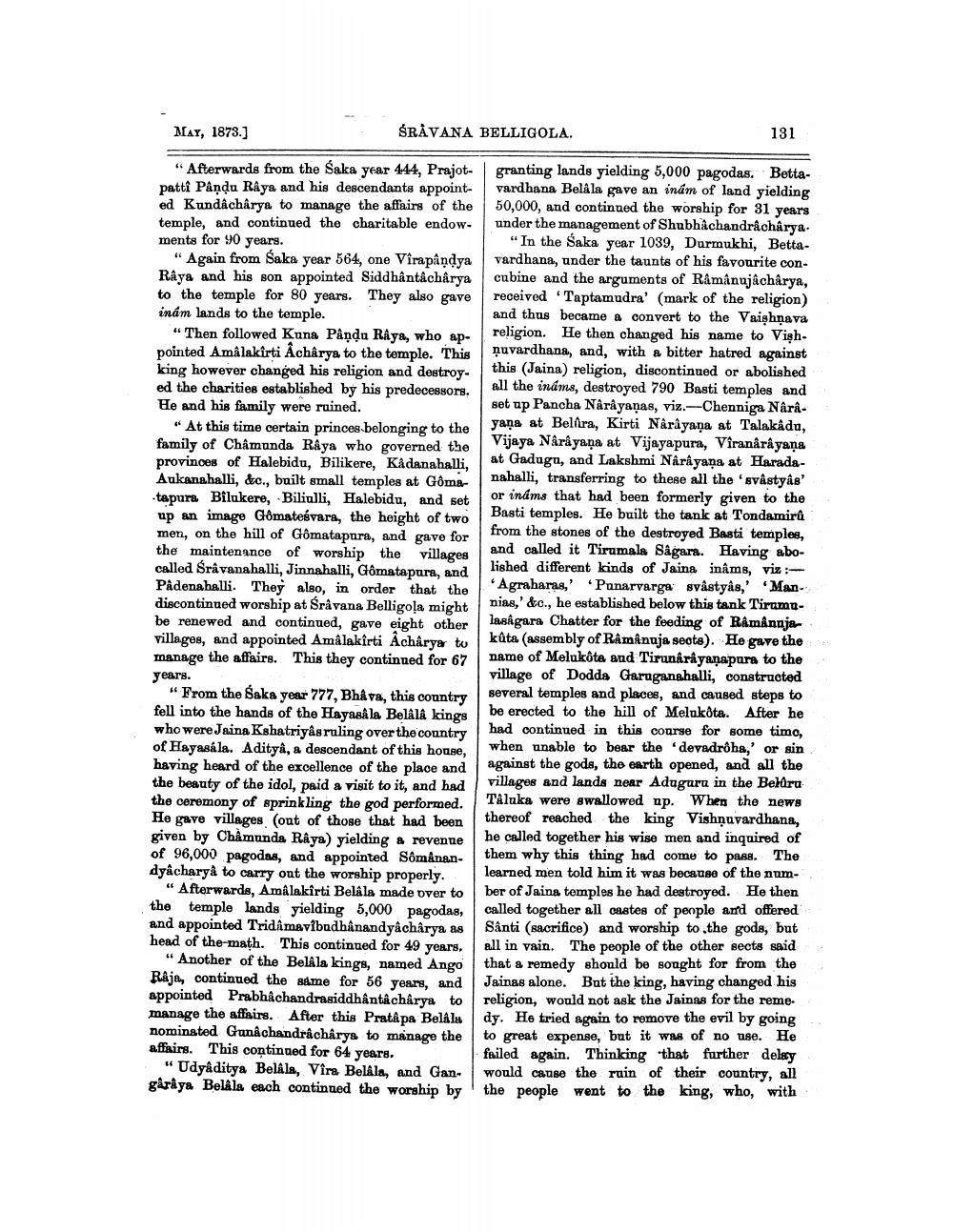________________
MAY, 1873.)
ŚRÅVANA BELLIGOLA.
131
"Afterwards from the Saka year 444, Prajot- patti Pandu Raya and his descendants appointed Kundacharya to manage the affairs of the temple, and continued the charitable endowments for 90 years.
"Again from Saka year 564, one Vîrapandya Raya and his son appointed Siddhântâcharya to the temple for 80 years. They also gave inám lands to the temple.
Then followed Kuna Pându Raya, who appointed Amalakirti Acharya to the temple. This king however changed his religion and destroyed the charities established by his predecessors. He and his family were ruined.
"At this time certain princes belonging to the family of Châmunda Rêya who governed the provinces of Halebidu, Bilikere, Kâdanahalli, Aukanahalli, &c., built small temples at Gômatapura Bilukere, Biliulli, Halebidu, and set up an image Gômateśvara, the height of two men, on the hill of Gômatapura, and gave for the maintenance of worship the villages called Śrávanahalli, Jinnahalli, Gômatapura, and Padenahalli. They also, in order that the discontinued worship at Sravana Belligola might be renewed and continued, gave eight other villages, and appointed Amalakirti Acharya to manage the affairs. This they continued for 67 years.
"From the Saka year 777, Bhêva, this country fell into the hands of the Hayasâ la Belâlâ kings who were Jaina Kshatriyas ruling over the country of Hayaskla. Aditya, a descendant of this house, having heard of the excellence of the place and the beauty of the idol, paid a visit to it, and had the ceremony of sprinkling the god performed. He gave villages (out of those that had been given by Chåmunda Raya) yielding & revenue of 96,000 pagodas, and appointed Sómanandyacharya to carry out the worship properly.
"Afterwards, Amalakîrti Belâla made over to the temple lands yielding 5,000 pagodas, and appointed Tridamavibudhanandyacharya as head of the math. This continued for 49 years,
"Another of the Belala kinge, named Ango Raja, continued the same for 56 years, and appointed Prabhâchandrasiddhântâ charya to manage the affairs. After this Pratâpa Bella nominated Gunâchandracharys to manage the affairs. This continued for 64 years.
"Udyaditya Belala, Vira Belala, and Gan. gåraya Belåla each continued the worship by
granting lands yielding 5,000 pagodas. Bettavardhana Belala gave an inám of land yielding 50,000, and continued the worship for 31 years under the management of Shubhachandracharya.
"In the Saka year 1039, Durmukhi, Bettavardhana, under the taunts of his favourite concubine and the arguments of Ramanujacharya, received Taptamudra' (mark of the religion) and thus became a convert to the Vaishnava religion. He then changed his name to Vish. nuvardhana, and, with a bitter hatred against this (Jaina) religion, discontinued or abolished all the indms, destroyed 790 Basti temples and set up Pancha Narayaņas, viz.--Chenniga Narkyaņa at Belira, Kirti Narayana at Talakadu, Vijaya Narayana at Vijayapura, Viranarayana at Gadugu, and Lakshmi Narayana at Haradanahalli, transferring to these all the 'svåstyâs' or indms that had been formerly given to the Basti temples. He built the tank at Tondamirů from the stones of the destroyed Basti temples, and called it Tirumala Sågara. Having abolished different kinds of Jaina inâms, viz:* Agraharas,' 'Punarvarga svåstyâs, Man. nias,' &c., he established below this tank Tirumulasagara Chatter for the feeding of RÅmångja küta assembly of RÂmânuja seota). He gave the name of Melukota and Tirunarayanapura to the village of Dodds Garuganahalli, constructed several temples and places, and caused steps to be erected to the hill of Melukðta. After he had continued in this course for some timo, when unable to bear the devadróha,' or sin against the gods, the earth opened, and all the villages and lands near Adugaru in the Bekara Taluka were swallowed up. When the news thereof reached the king Vishnuvardhana, he called together his wise men and inquired of them why this thing had come to pass. The learned men told him it was because of the number of Jaina temples he had destroyed. He then called together all castes of people and offered Santi (sacrifice) and worship to the gods, but all in vain. The people of the other sects said that a remedy should be sought for from the Jainas alone. But the king, having changed his religion, would not ask the Jainas for the reme. dy. Ho tried again to remove the evil by going to great expense, but it was of no use. He failed again. Thinking that further delay would cause the ruin of their country, all the people went to the king, who, with




